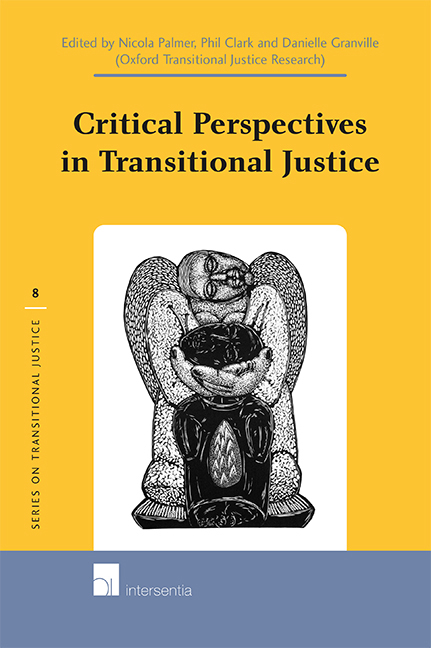Book contents
- Frontmatter
- Note
- Acknowledgements
- Contents
- Abbreviations
- Introduction
- Section 1 Critiquing Core Concepts in Transitional Justice
- Section 2 Accountability, Human Rights and the Rule of Law
- Section 3 Locality and Legitimacy
- Section 4 Memory, Ritual and Apology
- Section 5 Transitional Justice After Transition
- Contributors’ Biographies
- Series on Transitional Justice
16 - Commentary on Locality and Legitimacy
Published online by Cambridge University Press: 22 December 2020
- Frontmatter
- Note
- Acknowledgements
- Contents
- Abbreviations
- Introduction
- Section 1 Critiquing Core Concepts in Transitional Justice
- Section 2 Accountability, Human Rights and the Rule of Law
- Section 3 Locality and Legitimacy
- Section 4 Memory, Ritual and Apology
- Section 5 Transitional Justice After Transition
- Contributors’ Biographies
- Series on Transitional Justice
Summary
In places where national justice systems were unable or unwilling to deal with the abuses of the past, it is often victims and survivor groups, human rights NGOs and other civil society organisations that have historically provided services to and campaigned on behalf of those most affected by conflict. However, in the case of the tribunals established to deal with atrocities committed in the former Yugoslavia and Rwanda, once the wheels of international justice began to turn, there was a widespread concern that the voices of those affected became instrumentalised to meet the needs of these large and legalistic institutions. Local actors, and sympathetic international stakeholders, have since worked hard to ensure that such instrumenentalisation does not go unchallenged. International lawyers can no longer mask professional arrogance and the desire for exclusive control by deploying the rhetoric that they are simply ‘seeking justice’.
As evidenced by the chapters in this section, one detects an increased confidence among local actors concerning the capacity of civil society to complement, challenge, critique or circumnavigate the efforts of ‘top down’ initiatives such as trials or truth commissions which for many years appeared ‘the only show in town’. The more sophisticated version of such challenges is not in any sense a rejectionist discourse. Rather, as Richard Falk has suggested, the view ‘from below’ is really a way of providing a different vantage point in order to ‘see’ more clearly connections, accommodations and relationships with institutions and structures ‘from above’. Neither does it suggest a facile or overly romanticised notion of the community as a site of harmony. Instead, it recognises community as a site of potential violence, hierarchy and unequal power relationships. Good practice emerges and is sustained in such places through a cold-eyed assessment of risks and local capacity and developing ways to protect against those risks and enhance existing skills and abilities.
The four chapters here chart such interactions in different ways. Although there are a range of overlaps, perhaps the key overarching theme which links all four is the notion of legitimacy. In the context of transitional justice, legitimacy may be viewed as a way of conceptualising the relationships among justice, legality and power.
- Type
- Chapter
- Information
- Critical Perspectives in Transitional Justice , pp. 311 - 318Publisher: IntersentiaPrint publication year: 2012



